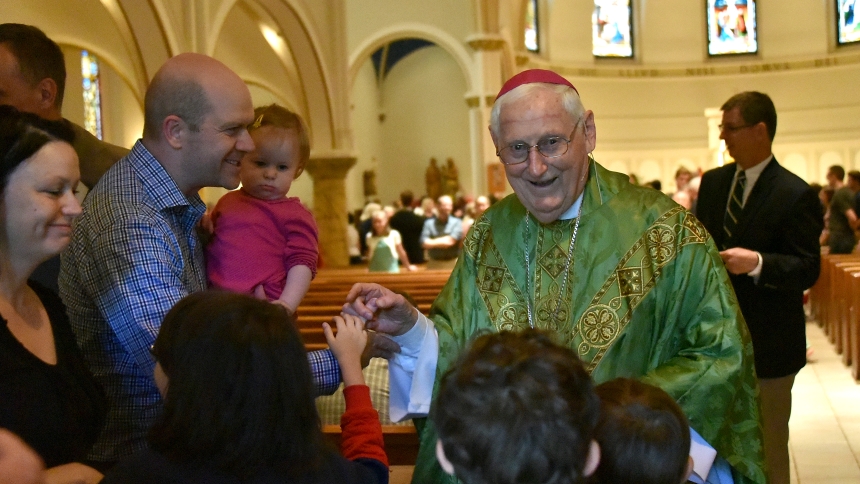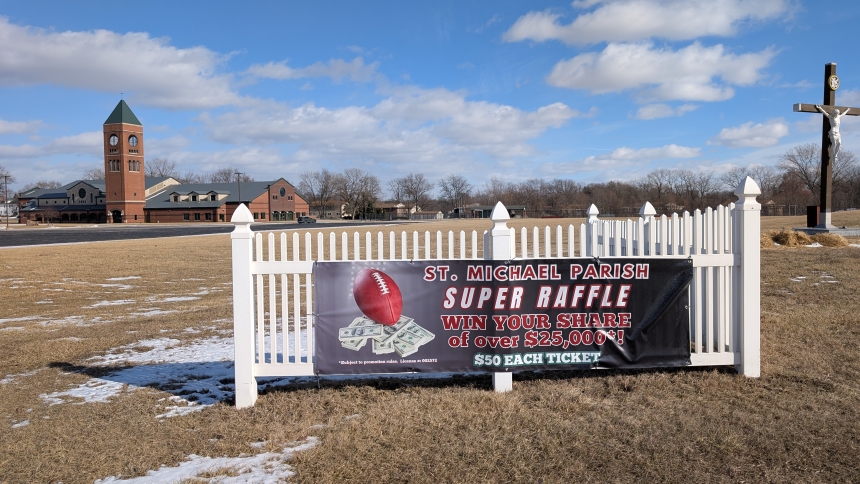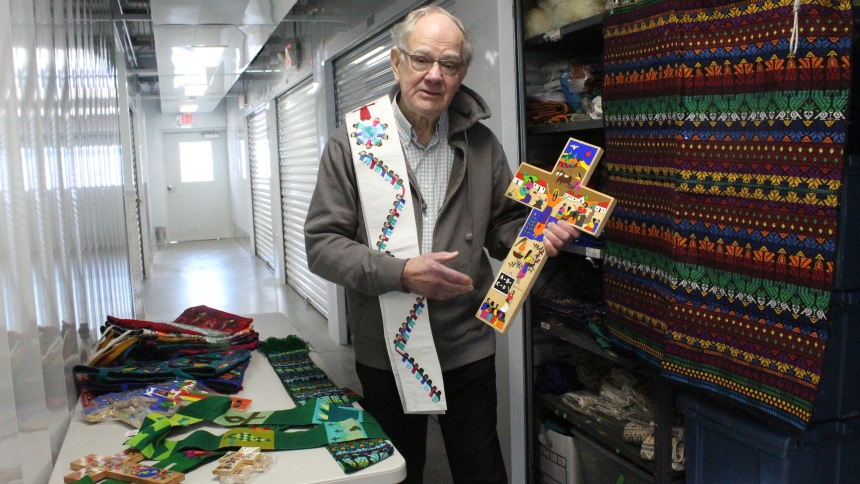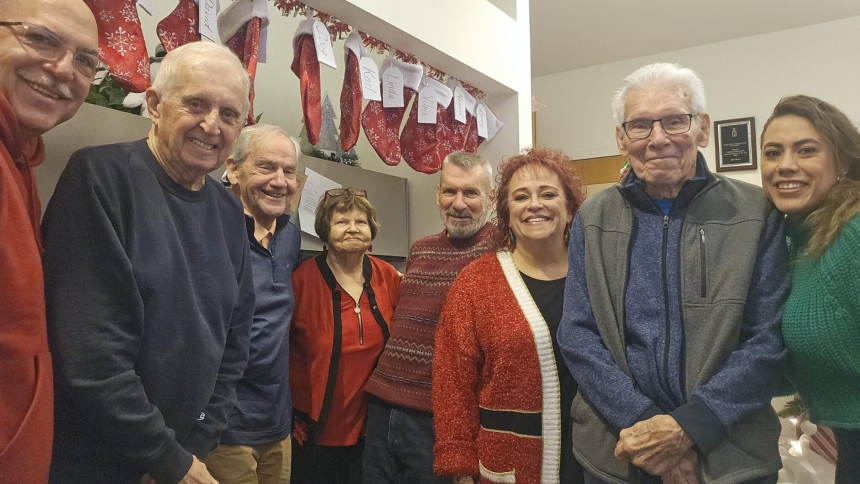
LANSING, Mich. – Remembered by many in the Diocese of Gary as a bold and holy priest who joyfully ministered in the vineyard, the passing of native son Bishop Carl F. Mengeling stirred up bittersweet feelings and cherished memories of a man who wished all “health, happiness and holiness.”
The late clergyman served as an associate, pastor and instructor in numerous assignments in Northwest Indiana since his ordination by Bishop Andrew G. Grutka, among the first class of diocesan priests in 1957. He was named the Bishop of Lansing in 1995 by Pope John Paul II. He died on July 1 at age 94.
Bishop Mengeling remained in Lansing after serving as the leader of the more than 185,000 Catholics in central Michigan until 2008, always saying, “I haven’t retired,” as he served as a confessor, preacher and writer. The Hammond-born priest founded the nationally renowned FAITH Catholic publications and led the Church into the new millennium with a spirit of accountability and growth – blessing 12 new churches, a high school and a convent. He fought cancer into remission more than 15 years ago.
An assembly of clergymen including Bishop Robert J. McClory and several diocesan priests joined presider Bishop of Lansing Earl A. Boyea to concelebrate a requiem Mass at St. Mary Cathedral in the city’s downtown on July 10. Hundreds had visited Bishop Mengeling’s showings, and many followed a motorcade to nearby St. Joseph Cemetery for his interment.
“He has pastored us well,” Bishop Boyea said in his homily. “It was the message of the Gospel, which he proclaimed loudly and clearly; he definitely wanted Jesus to increase among and within all of us. Secondly, Bishop Carl’s aim has always been to bring us home. Thirdly, Bishop Carl knew that there was only one way to achieve these aims: by laying down his life – even as Jesus did – as the singular method of leading the people of God.”
Region residents recently paid tribute to Bishop Mengeling with social media posts, expressing that he will be missed and calling him “a true man of God,” “one-of-a-kind,” “a good and faithful servant,” “one of the best teachers,” and “someone who used his years wisely.”
Some recalled the episcopal motto, “He must increase” from John 3:30, chosen by Bishop Mengeling when he was appointed as shepherd of Lansing. One way the Church leader worked to build the kingdom was through advancing Catholic education as a primary path to knowledge of the Lord and holiness.
His efforts were applauded by 1993 St. Thomas More School graduate Julie Greenberg.
“It's amazing how young I was but yet have so many memories of Bishop Mengeling,” said Greenberg of Chesterton. “I remember his enthusiasm during the homilies. He would bounce on his feet, wave his arms, and didn't need a microphone for everyone to hear him ... I remember him always greeting others like they were the only person that mattered at the moment."
Though Nativity of Our Savior Director of Religious Education Jason Yurechko never met Bishop Mengeling, he has always appreciated the legacy of the man who directed the construction of the school and gymnasium in the 1970s, even before the nascent parish built a permanent church building (which then-Father Mengeling oversaw in 1983.)
“His foresight and legacy is amazing,” said Yurechko, whose son and daughter are Stars alumni. “We’re worshipping God in (his church) and I teach in the school everyday.
He added, “I stand on the shoulders of giants and Bishop Mengeling had some pretty big shoulders here.”
In 1972, at the request of Bishop Grutka, then-Father Mengeling founded the Institute of Religion, a prototypical lay educational initiative, according to senior priest Father Dominic Bertino.
A diocesan historian, Father Bertino observed that then-Father Mengeling sought to keep children and youth steeped in Catholic culture and believed “It's not going to work unless the parents are catechized.”
Father Bertino added, “He saw that as important.”
Senior priest Father Edward Moszur served as a transitional deacon in 1970 under then-Father Mengeling’s direction. He observed how the pastor’s concern for catechesis for lay people extended beyond his own churchyard.
“He was concerned not only for his parish, but for the diocese, even before he was bishop of Lansing," Father Moszur said. “I think he saw that as a responsibility and that’s what inspired him for that Institute of Religion.”
Then-Monsignor Mengeling’s attention was not limited to those in the pews; he maintained healthy fellowship and mentorship with brother priests. Father Martin Dobrzynski, pastor of St. Michael the Archangel in Schererville, served with the priest for a brief time, immediately following his ordination in 1984.
His practical advice hinted at his future prowess as a bishop. “I think that’s what they appreciated, that he was always a pastor,” Father Dobrzynski said. “He would never ask pastors to do things that he had never done before ... He really understood what has to happen in the trenches.”
Bishop Mengeling’s brother priests appreciated the late prelate’s ability to feel the pulse of the people, through his skills of observation and communication. Whether in counselling a heartbroken parishioner, or being an advocate for a fellow clergyman, “there was always a joy” in whatever the challenge was.
“People were very important to him, and he always tried to make them a better Catholic by his own witness, whether it was in prayer, or in his sense of humor,” explained Father Moszur.
For as much as he was known for his reverence with traditional Eucharistic worship and hold-no-punches sermons advocating Church teachings on human life, Bishop Mengeling could inject well-timed humor to emphasize a point.
Flair for a sudden dramatic gesture during a presentation or an exaggerated remark during his otherwise flowing and theologically rich narrative homilies was not out of turn. During his sermon as a visiting presider at St. Michael the Archangel a few years ago, Bishop Mengeling made an initially pearl-clutching remark that later had some Mass-goers in stitches.
The bishop applauded the lector “who annunciated and not mumbled.” He then jokingly said that in his diocese it is a punishable capital offense to muffle their readings.
Father Bertino recalled an exchange with Bishop Mengeling in 1987, when the St. Thomas More pastor asked him to preach at a 40 Hours Devotion. Accepting the offer, he delivered remarks on the first night while feeling “a bit out of sorts.”
The next night, Father Bertino said he was more pleased with his own delivery.
“So, we walked in the sacristy, and Monsignor Mengeling looked at me and said, ‘That was wonderful. Last night, not so much,’” Father Bertino recalled. He added that at a priest meeting soon after, the Munster pastor turned the spotlight on the improved orator jokingly telling the clergymen that “Bertino’s preaching.”
Happiness is being a good listener, Bishop Mengeling once said. “You have to be available,” the bishop remarked in a 2018 interview. “The main thing for a priest or bishop is to be a good listener, and they pick that out right away.”
In 2022, Bishop Mengeling said he began compiling his writings about Jesus, under the title, “The Great Listener.”
On the day of Bishop Mengeling’s passing, Bishop McClory issued a note to diocesan clergy, which included remarks about his appreciation of the prelate’s friendship. “Bishop Mengeling was so very kind to me going back to my time in Michigan and especially as I became the Bishop of Gary. He will be missed but was more than ready to meet our Lord,” he wrote.
Born in 1930, Carl Mengeling, named after St. Charles Borromeo, was baptized as a Catholic at age nine after being raised as a Lutheran. He excelled in academics at St. Mary School in Griffith and during high school in Highland, he immersed himself with literature. He enrolled in St. Meinrad College and Seminary in St. Meinrad, Indiana, where he was taught by Benedictines.
On May 25, 1957, Bishop Mengeling was ordained by Bishop Grutka at the Cathedral of the Holy Angels in Gary. He served at the former St. Mark in Gary. In the early 1960s, Bishop Mengeling was a page during sessions of the Second Vatican Council in St. Peter’s Basilica, while he was studying to earn a License in Sacred Theology at the Angelicum University and a Doctorate in Sacred Theology at Alfonsianum Academy.
Mengeling taught at Bishop Noll Institute and Calumet College of St. Joseph and was a pastor at All Saints, also in Hammond. He served at Holy Name in Cedar Lake, before a 14-year pastorate at Nativity.
Named a monsignor by Pope John Paul II in 1984, Bishop Mengeling was assigned to St. Thomas More in Munster a year later. At the helm of what he called the “flagship parish” of the diocese, he initiated the expansion of church ministries and directed the construction of additional classrooms for a kindergarten.
Caption: Bishop emeritus Carl F. Mengeling of Lansing, Mich. greets the faithful at the conclusion of the 150th anniversary Mass of the founding of the parish school at St. Thomas the Apostle in Ann Arbor, on Sept. 8, 2018. Bishop Mengeling was part of the Diocese of Gary inaugural ordination class and served as a high school and college instructor and pastor at parishes including St. Mark, All Saints in Hammond, Holy Name, Nativity of Our Savior and St. Thomas More, before being ordained as a bishop in January 1996. (Anthony D. Alonzo photo)



